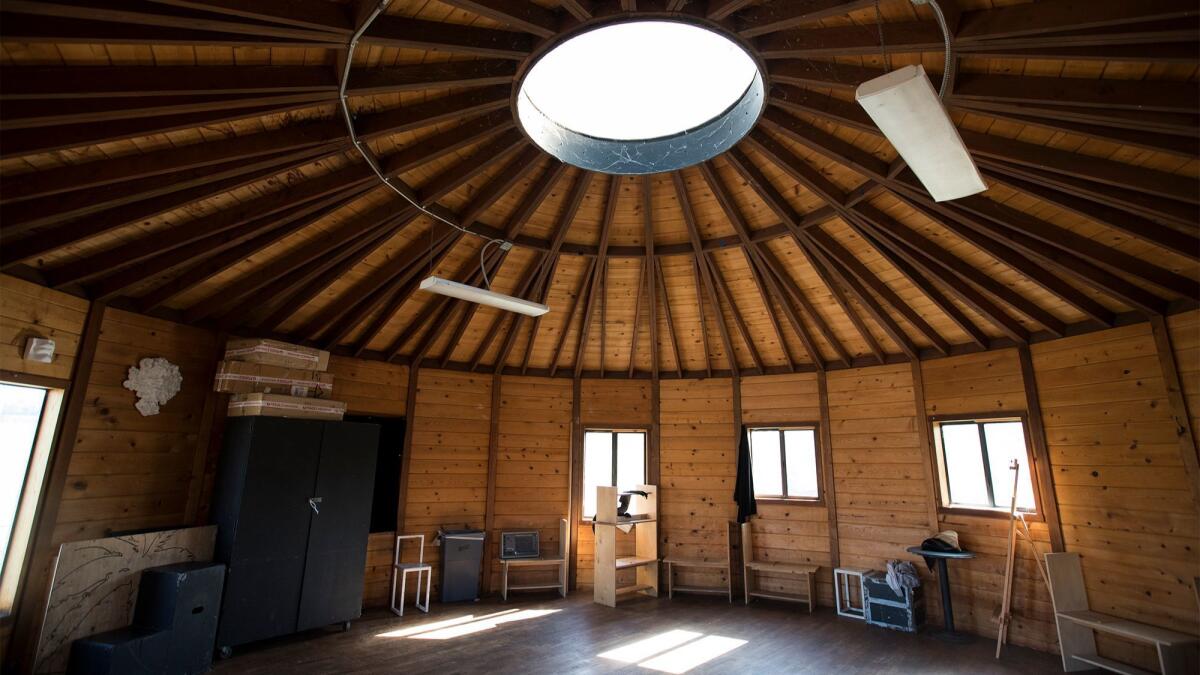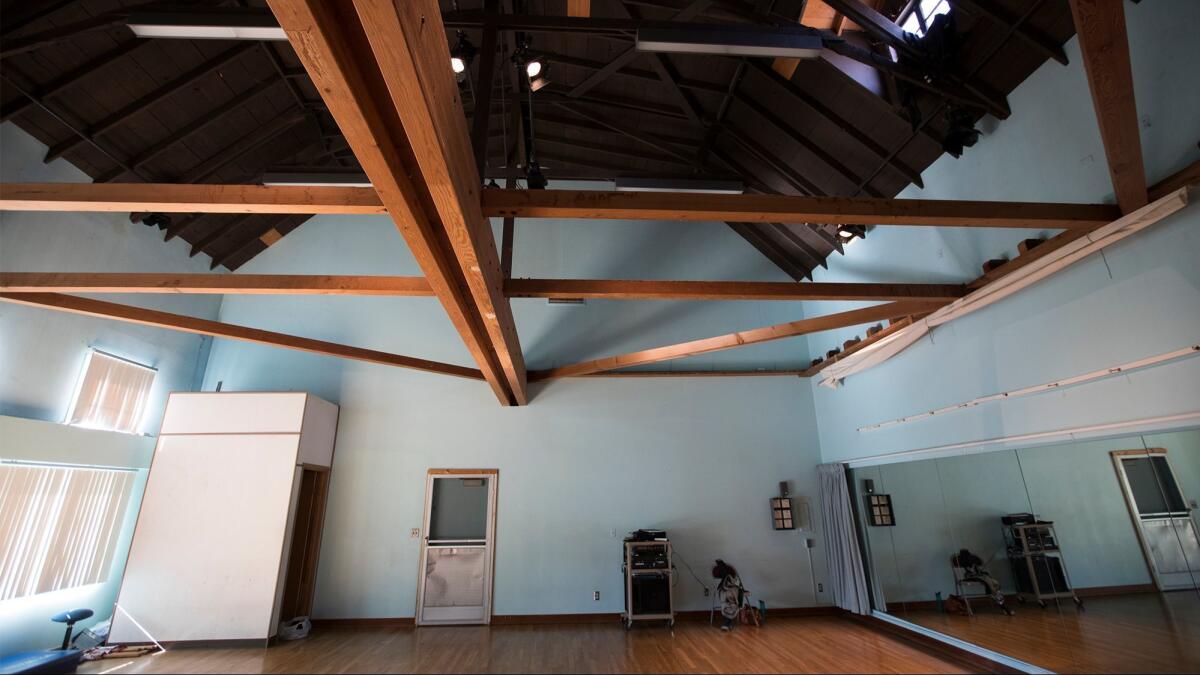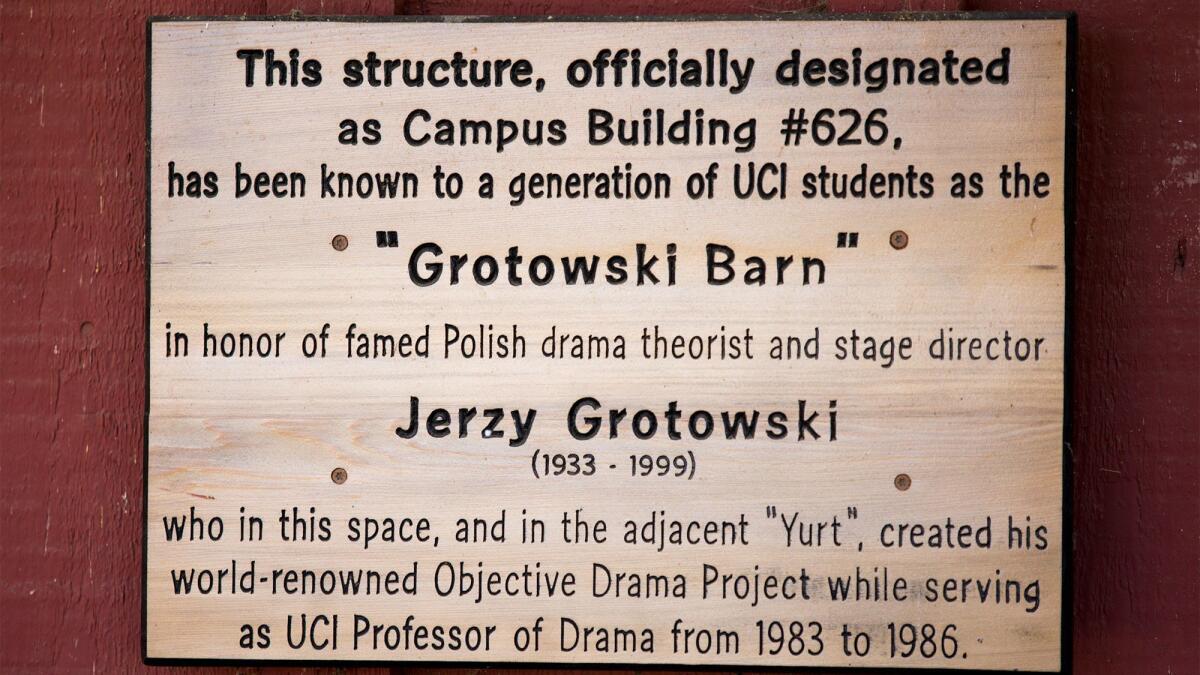Historical barn and yurt at UC Irvine reflect local legacy of famed theater director Jerzy Grotowski

- Share via
Before theater director Jerzy Grotowski became a UC Irvine professor, he made an unusual request.
“I said, ‘I can hire you full-time with perks,’” said Robert Cohen, the founding chair of the school’s drama department, recounting the conversation. “He said, ‘Well, what I really want is a barn.’”
Cohen wracked his brain, trying to produce a solution to the odd request. Luckily, the school’s campus was built on a cattle range and there was a barn being used as a storehouse.
Grotowski got his barn. He had taught in barns since his days in Poland. Eventually, the unconventional director also had a wooden yurt built nearby.
These two buildings, seemingly at odds with the rest of the developed UC Irvine campus, were used by Grotowski when he taught at the school from 1983 to 1986. Today, the buildings are considered theatrical landmarks.
Grotowski, who died in 1999 at age 65, was once considered the greatest theater director in the world, with his shows attracting people from all corners of Europe.
In 1982, the Polish native found his way to New York, though his country was controlled by the Soviet Union and navigating across borders would have been difficult.
“During the Soviet occupation of Poland, he couldn’t leave the country nor could anybody else,” said Cohen, 79, of Laguna Beach. “We suddenly found out he was in New York. He had, I guess, escaped.”
Cohen, an admirer of Grotowski, was notified by a friend that the director was looking to come to California. Cohen naturally thought it would be desirable to lure the director to a position at the school.
Grotowski would eventually agree to the role following an all-night party at Cohen’s home, though he had that one curious stipulation regarding the barn.
While teaching at the school, Grotowski’s unusual disposition endeared him to his students and the faculty.
“He was an odd person,” said Cohen, while pointing out that Grotowski had a tendency to allow only a handful of people into his plays in Europe.
“People would say, ‘I have tickets,’ and he would say, ‘Too bad,’” Cohen said.
Grotowski held his classes at erratic times, generally having his students dance through the night.
His students limited their schedules to his class so they could sleep during the day, usually being informed of the class time only a day beforehand.
“I don’t think we could allow this to happen today, but it was wild enough in those days,” Cohen said.
Grotowski’s teaching methods also were atypical.
Cohen, while sitting in on one of the classes, said Grotowski had students perform a variety of physical exercises like freezing in a half-squat position for 15 minutes.
When asked what benefits these techniques provided for theater students, Cohen responded, “God can tell me. I have no idea.”

Grotowski, always the innovator, experimented with physical forms of theater while working on a research project called Objective Drama, which analyzed how ancient rituals affect participants.
Grotowski had the yurt built to provide respite for his tired students amid the midnight ventures. A yurt is a round tent-like building traditionally used by Central Asian nomads.
The structures attracted the interest of the countercultural movement in the 1970s.
Cohen said both of these buildings are considered historical landmarks. They also serve as physical markers in the winding down of the life of the great director.
Grotowski was dying of cancer when he made his pilgrimage to UCI.
“He knew he was dying when he came here,” Cohen said. “I was the only one who knew.”
Periodically, Grotowski would fly to France to see his physician. One day he called Cohen and said he was going back to Europe.
He settled in Pontedera, Italy, where he eventually died.
UCI is the only American school Grotowski taught at, Cohen said. He had come here after retiring as a director in Poland with the intent of passing on his knowledge.
“I don’t know if his cancer diagnosis had anything to do with it,” Cohen said. “I mean, everything does.”

Currently, Grotowski’s yurt is controlled by the drama department and professor Annie Loui uses the barn as her studio space to develop physical theater productions, which are characterized by a combination of traditional theater with spoken dialogue and a reliance on physical movement to tell a story.
Loui, 63, of Silverado took control of the barn when she was hired by the school in 1992 after learning that it was previously used by Grotowski, with whom she briefly studied in France.
As an admirer of Grotowski and practitioner of experimental theater, Loui has sought to uphold some of the same principles with which the famed theater director governed his teaching space, like taking shoes off when entering the building and treating it as a temple.
“The barn was treated reverently by Grotowski and his students,” Loui said. “That was part of his whole ethos — that the space was sacred and you always keep it clean.
“I am very clear about this with students every year, that we are working in Grotowski’s legacy, so it’s a place we need to respect and take care of.”

Twitter:@benbrazilpilot
All the latest on Orange County from Orange County.
Get our free TimesOC newsletter.
You may occasionally receive promotional content from the Daily Pilot.




